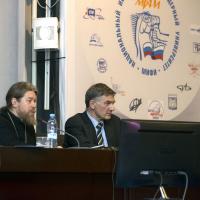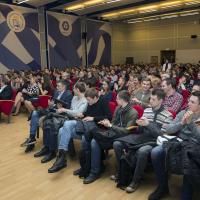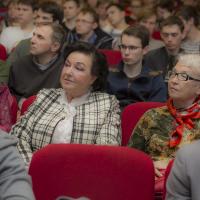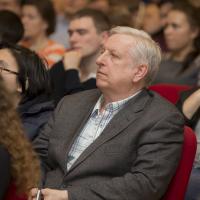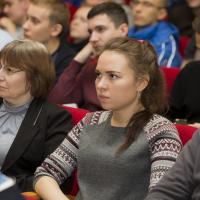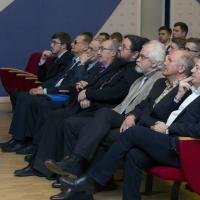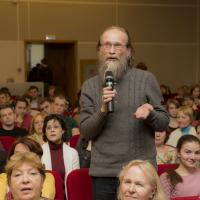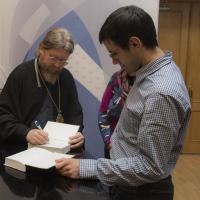On April 5, 2017 MEPhI has been visited by the governor of the Sretensky Stavropigialny Monastery, the rector of the Sretenskaia Theological Seminary, the chairperson of the Patriarchal Council for Culture Bishop Tikhon Egorievsky (Shevkunov). Within the framework of his visit, Bishop Tikhon delivered a lecture in the Assembly Hall on topic: "The February Revolution of 1917: what was that?". Before the beginning of the lecture the rector of MEPhI Mikhail Strikhanov presented the guest to the students, teachers and staff of the university and briefly spoke about the public and church activities of Vladyka.
"For me, indeed, it is a great honor to speak in this room before the teachers and students of the truly great Higher School of the Soviet Union, Russia. The topic that we agreed to discuss and talk about is "The February Revolution: What Was That?". Discoveries of our own history and is not only an exciting but also an important matter for every thinking person ... And for all the importance of that creative great work that you are doing, I am convinced that every thinking person should independently and objectively investigate on the facts, sources, many Questions of our history," Bishop Tikhon began his lecture with such words.
"What happened in February 1917 radically changed the history not only of our entire country, but of the entire world. In Soviet times, we were convinced that in February 1917 a bourgeois revolution took place. The tops could not live in the old way, and the lower classes did not want to live the old way. We were taught that there was a helpless emperor, there was a decayed Russian Empire, a poor peasant family entangled in contradictions, peasants without land, a lot of problems that are absolutely insoluble. And all by itself leads to a terrible explosion. And then February was resolved by such a revolution, which had colossal consequences not only for Russia, but for the whole world." Was it really all about what they said and taught in Soviet times? To answer this question during his lecture Bishop Tikhon cited statistics on the situation of the Russian Empire on the world stage during the reign of Emperor Nicholas II. Russia by 1913-1914 was one of the leading countries in the world. In particular, he noted that "Russia overtook the United States of America in terms of industrial production growth by 1914. The Russian Empire was on the economic indicators on the 4th or 5th place. It shared the fourth place with France. The budget of the Russian Empire increased threefold without raising taxes. Free medical care, women's pregnancy payment were introduced. Salaries of workers in large cities were slightly lower than in England and Germany at that time. Special attention of the government was paid to ducation. Between 1896 and 1910, more schools, colleges and institutes were opened than in the entire preceding 1896 period of Russian history. So, the economic situation in Russia was by no means catastrophic."
Who and why did this revolution, and why did the people allow bloody terrible trials? Vladyka answers this question: "The Bolsheviks, as we know, were one of the main engines of the revolutionary events of the twentieth century. But the Bolsheviks were not the main driving force of revolutionary, protest processes. There was a more serious party of the Socialist-Revolutionaries. " <> "... For many decades anti-monarchist agitation was under way, which all the thinking, creative society of Russia, joined. The Emperor was hated, his wife was considered a German spy. And as our remarkable historian Solonevich said: "The revolution was due to gossip, but this gossip was believed." The gossip was that Rasputin was leading the empress, and the empress was in turn leading the emperor."
Further, Vladyka spoke in detail about the events connected with the abdication of Emperor Nicholas II from the reign: "On February twenty-third the Emperor lures from Petrograd General Alekseev. And at this time in Petrograd, women and children were taken to the streets with protests against hunger. What's the hunger there? The only thing was that for 2-3 days there was no delivery of black bread. And the same rumors began about the onset of the famine, demonstrations, strikes, and the smashing of windows began. In Russia there was a leading military plant Putilovsky, and Putilov was connected with the leaders of the coup. On February 24, 38,000 workers were expelled from the factory to the street, who were left without pay and without armor (in the army). The next day, 200,000 people were on strike, the next day 400,000 people. A military garrison of Petrograd joined them, and General Khabalov, who was commander of the Petrograd Military District, could not cope with this, or maybe he did not want to. Terrible revolutionary events began. Nicholas II sees that his orders are not being executed, ignored, he is sent to Petrograd, but he is not allowed. And when Nicholas II sees that the whole army, the Duma and the aristocracy are against him, and everyone puts an ultimatum - either you renounce, or the front collapses and a civil war begins. And then he agrees to abdication."
At the end of the lecture, Bishop Tikhon shared his thoughts on the revolution that had taken place: "The February revolution was created by people who love Russia. They wanted Russia the most kindly and wanted at any cost to bring their intentions to life, fulfill their dreams. These infinitely loving people led Russia to the power of a man who said "I, gentlemen, are good, do not care about Russia" (V.I. Lenin said in a conversation with Georgiy Solomon). And we perfectly know bloody consequences. The grouping of terrorists took power. ... In Petrograd, his mission was carried by the French ambassador, Maurice Palaeologus, and he said the words that are significant for us: "I do not know of any more suggestible people than the Russian people." Here we are paying for this suggestiveness, not only in the February period, but also in many other periods of our history."
On the centennial anniversary of the Russian revolution of 1917, the topic of fateful events of centuries ago is actively discussed in society. Lecture on this topic caused a special interest among all listeners. At the end of the lecture, Bishop Tikhon was asked numerous questions.





